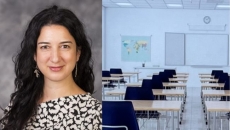STAR BLANKET CREE NATION - A First Nation in Saskatchewan says ground-penetrating radar has discovered more than 2,000 areas of interest and a child's bone was separately found at the site of one of the longest-running residential schools in the country.
Star Blanket Cree Nation Chief Michael Starr said Thursday it shows the harsh truth of what happened within the walls of the Qu’Appelle Indian Residential School.
“It was unthinkable. It was profound. It was sad. It was hurtful," Starr said Thursday. "And it made us very angry what had happened to our young people here."
Areas for the search were selected after testimonials from former students and elders who witnessed or heard stories of what happened at the residential school about 75 km northeast of Regina.
The jawbone fragment, found last October, was identified by the province's coroner's service to be that of a childbetween the ages of four and six from about 125 years ago. It was not locatedanywhere near an area that was known to be a graveyard.
“This is physical proof of an unmarked grave,” said project lead Sheldon Poitras.
Poitras said his team is looking at options, including miniature core drilling to enable DNA testing, to confirm what is there.
He said the area where the school was located makes it difficult to do ground-penetrating radar and they don't believe all areas of interest are unmarked graves.
The institution was also known as the Lebret, St. Paul's and Whitecalf school. It burned down and was rebuilt twice.
Prime Minister Justin Trudeau called the discovery "difficult news" and said the federal government will help the First Nation every step of the way.
“I am profoundly saddened and disturbed to learn of the findings of a child’s remains and potential unmarked graves at the former Lebret (Qu’Appelle) residential school in Saskatchewan," Trudeau said in a statement.
“No child should ever have been stolen from their family. No child should ever have been robbed of their childhood, their culture, their community, or their language.
"No child should ever have faced the unthinkable abuse, loneliness, and fear they did at these so-called schools like the one in Qu'Appelle Valley. And no child should have ever spent their last moments suffering in a residential school and have their life stolen from them."
Crown-Indigenous Relations Minister Marc Miller said on social media that the "finding of human remains of a very young child at the site of Lebret Residential School is not only a tragic reminder of Canada’s painful history and of the heinous acts that were committed in residential schools, it’s further proof of that."
The school was one of the first three to open in Canada and was run by the Roman Catholic Church through the Missionary Oblates of Mary Immaculate from 1884 to 1973.
It operated for another 25 years until it closed in 1998.
An estimated 150,000 Indigenous children were forced to attend residential schools over a century in Canada and the Truth and Reconciliation Commission's final report detailed that many experienced emotional, physical, sexual and spiritual abuse.
The school had a reputation for strict religious instruction, strenuous physical labour and physical abuse. Survivors told the commission about extended periods of kneeling, beds being pushed over with kids still on top and slaps across the face. One survivor shared how he saw a fellow student tied to a heat register.
The school often had outbreaks of disease and a high mortality rate, the commission's report found. Louise Moine wrote about tuberculosis rampaging through the school in her memoir.
"There was a death every month on the girls’ side and some of the boys went also," Moine wrote.
The National Centre for Truth and Reconciliation hasa record of 56 student deaths at the school.
Sharon Strongarm, a survivor of the school, held back tears Thursdayas she explained how she was taken from her parents. She said she and her siblings had to learn to survive and to forgive.
"They tried to take our spirits away. They tried to take the Indian out of us," she said. "But thank the Creator we are back here, strong as we will ever be, helping each other.”
The community is looking to expand its search areas and have approval from some nearby landowners to start work in the spring. They are also looking to excavate two unexpected rooms that were located underground during the initial search, Poitras said.
Chief Bobby Cameron of the Federation of Sovereign Indigenous Nations said people are feeling anger and pain. There is a need for justice, he added.
"That little baby, those bones, was someone’s child, someone’s grandchild," Cameron said.
Ottawa spent years building and funding residential schools that caused so much harm, Cameron said. Now, he said, the federal government must build wellness centres to help communities heal.
"This country was literally built on the bones of our people and our blood is in this land.”
The federation represents 74 First Nations in Saskatchewan.
The Indian Residential Schools Resolution Health Support Program has a hotline to help residential school survivors and their relatives suffering trauma invoked by the recall of past abuse. The number is 1-866-925-4419.






